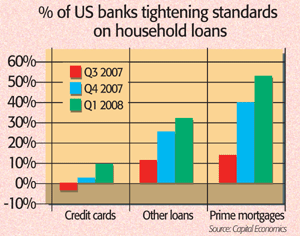
After a two-week run-up, markets tripped up again this week. America’s S&P 500 index slid by 3.2% on Tuesday, its worst day in almost a year, while the FTSE 100 lost 2.6%, the steepest daily declines since the mid-January slump. On Wednesday, Japan plummeted by 4.7%, only the tenth fall that large in a decade.
The latest gauge of activity in the US services sector, which accounts for 80% of the economy, was “downright disastrous”, as Stephen Stanley of RBS Capital put it. The index plummeted to 42 in January from 54 in December, reflecting the first contraction in five years. Following last week’s grim jobs data, this added to fears that the US is already in recession.
There was plenty of bad news elsewhere, too. The eurozone services sector slowed to a four-year low and near-stagnation in January and December retail sales slid by an annual 2%, a record decline. In Britain, too, “every early guide to growth collapsing is collapsing”, as Michael Saunders of Citigroup said. Housing has turned down and a survey of manufacturing this week pointed to the weakest activity in more than two years and business confidence in the services sector is at a six-year low.
Why it’s going to get worse
Meanwhile, the credit squeeze is getting worse, which will put further downward pressure on growth as lending declines. In the US, the latest Fed survey of loan officers shows banks expect to tighten lending even more in the first quarter “on nearly every conceivable type of loan to households and businesses”, noted Capital Economics. More than half of banks are tightening standards on prime mortgage lending and an unprecedented 80% are clamping down on commercial real estate lending.
In Europe it’s a similar story. With the securitisation market closed and balance sheets thus swollen with debt that cannot be sold on, it’s no wonder a January survey by the European Central Bank showed credit conditions tightened at 41% of eurozone banks – about a third more than in its October survey.
In Britain, too, the banks “are running scared towards credit tightening”, as Ian Campbell said on Breakingviews.com. Despite December’s rate cut the price of tracker mortgages has ticked up, and lending on credit cards is also being cut back; Egg cancelled credit cards for 160,000 customers this week. With banks clamping down on credit, “the “financing system is broken” and won’t improve until balance sheets are repaired, as James Saft said in The International Herald Tribune. In the meantime, the outlook for the global economy grows darker by the day.